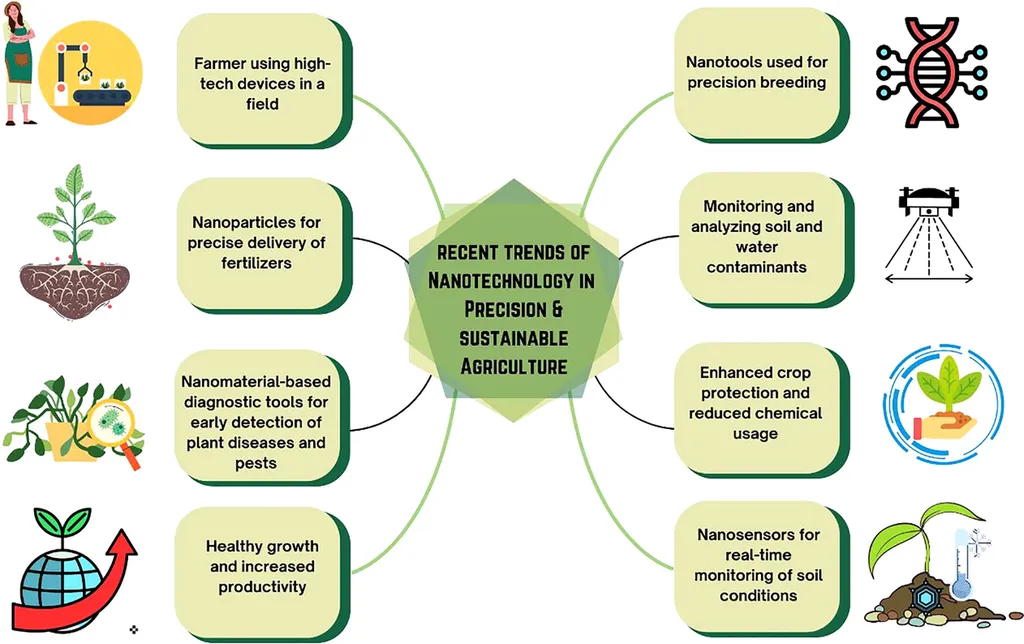In the quest to feed a growing global population while minimizing environmental impact, scientists are turning to the tiny world of nanotechnology for sustainable solutions. A recent study published in *Plant Nano Biology* explores the latest advances in nano-enabled strategies that could revolutionize agricultural practices, offering a glimpse into a future where precision and sustainability go hand in hand.
The research, led by Temoor Ahmed of the Xianghu Laboratory in Hangzhou, China, delves into the transformative potential of engineered nanomaterials in agriculture. These materials, often smaller than a billionth of a meter, are being harnessed to enhance crop productivity, improve nutrient delivery, and bolster plant resilience against environmental stresses.
One of the most promising applications highlighted in the study is the development of nanofertilizers. Traditional fertilizers often suffer from low efficiency, with a significant portion of nutrients lost to the environment, leading to pollution and wasted resources. Nanofertilizers, however, can be designed to release nutrients in a controlled manner, ensuring that plants receive the right amount at the right time. This precision not only boosts crop yields but also reduces the environmental footprint of agriculture.
“Nanofertilizers represent a paradigm shift in how we approach plant nutrition,” Ahmed explains. “By encapsulating nutrients within nanomaterials, we can protect them from premature degradation and ensure targeted delivery to the plant roots. This not only enhances nutrient uptake efficiency but also minimizes nutrient loss to the environment.”
The study also explores the use of nanomaterials to enhance crop stress tolerance. Climate change is exacerbating environmental stresses such as drought, salinity, and temperature extremes, which can severely impact crop productivity. Nanomaterials can be engineered to improve plant resilience by acting as antioxidants, detoxifying agents, or even signaling molecules that trigger stress-response pathways in plants.
Another exciting area of research is the integration of nanomaterials with precision agriculture technologies. Sensors and delivery systems based on nanomaterials can provide real-time data on soil health, plant health, and environmental conditions, enabling farmers to make informed decisions and optimize resource use. This convergence of nanotechnology and precision agriculture holds the promise of creating a more sustainable and efficient agricultural system.
The commercial implications of these advancements are substantial. As the global population continues to grow, the demand for food is expected to rise significantly. Nanotechnology offers a suite of tools that can help meet this demand while reducing the environmental impact of agriculture. Farmers stand to benefit from increased yields, reduced input costs, and improved resilience to environmental stresses.
Moreover, the development of nano-enabled agricultural products could open up new markets and create opportunities for innovation and investment. Companies that invest in this technology today could position themselves as leaders in the future of sustainable agriculture.
While the potential of nanotechnology in agriculture is vast, challenges remain. Ensuring the safety and environmental compatibility of nanomaterials is paramount. Researchers must continue to explore the long-term effects of these materials on ecosystems and human health to ensure that the benefits outweigh the risks.
As the field of nano-enabled agriculture continues to evolve, the research published in *Plant Nano Biology* serves as a testament to the innovative spirit driving this transformation. With continued investment and collaboration, nanotechnology could very well shape the future of sustainable agriculture, offering solutions that are not only effective but also environmentally responsible.
In the words of Temoor Ahmed, “The future of agriculture lies in our ability to innovate and adapt. Nanotechnology offers us the tools to do just that, paving the way for a more sustainable and productive agricultural system.”

